April 29, 2024 | 05:15 GMT +7
April 29, 2024 | 05:15 GMT +7
Hotline: 0913.378.918
April 29, 2024 | 05:15 GMT +7
Hotline: 0913.378.918
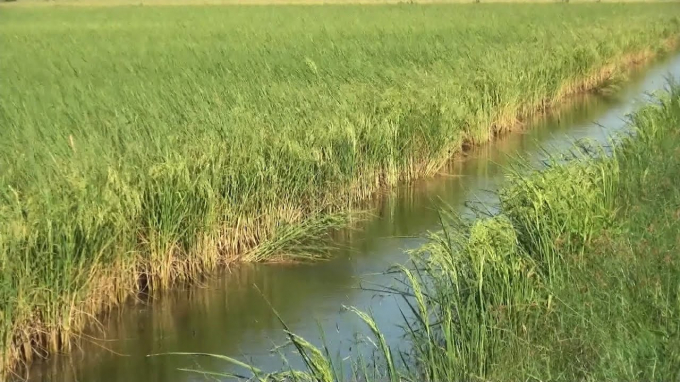
Five provinces in the Mekong Delta are implementing very effectively the technology of alternating all-male giant freshwater shrimp and rice crops. Photo: Vjst.
Five provinces, including Long An, Tien Giang, Ben Tre, Tra Vinh, Soc Trang, are implementing the project of intercropping all-male giant freshwater shrimp and rice crops approved by the Ministry of Agriculture and Rural Development, which will be conducted over three years, from 2019 to 2021.
Master Chau Huu Tri, Director of Ben Tre Agricultural Extension and Consulting Services Center, Project Manager, said that this model was first born thanks to the success of Research Institute of Fisheries 2 in creating all-male giant freshwater shrimp breeds. Next is the Mekong Delta region which is very suitable for giant freshwater shrimp to live and grow.
Since there was no all-male giant freshwater shrimp, the giant freshwater shrimp itself has grown in the natural conditions of this vast delta and it has become a favorite dish of the residents here.
Master Chau Huu Tri shared, more and more people, including those who live in the Mekong River Delta, are deeply feeling how climate change and sea-level rise have impacted their life and agricultural production.
There have been many workshops from the provincial to central level on what and how to do to help develop agriculture in the Mekong Delta sustainably. And the above-mentioned project is just one of many agricultural projects that the Ministry of Agriculture and Rural Development has implemented in recent years. To date, the project has traveled two-thirds of the way.
According to Master Chau Huu Tri, due to the impact of climate change and sea-level rise, in the coming years, the Mekong River Delta will have to convert an additional 90,000 ha of salt-flooded agricultural land to aquaculture. And by 2020, the whole region has 543,000 hectares of aquaculture, an increase of nearly 75,009 hectares compared to this area of 2010 and by 2030 the number will increase to 558,000 hectares.
However, to contribute to ensuring food security for not only nearly 100 million Vietnamese population but also the world, the Mekong Delta still has to take on the responsibility of producing 24 million tons of rice a year, so the above-mentioned exchange must still be associated with food security goals.
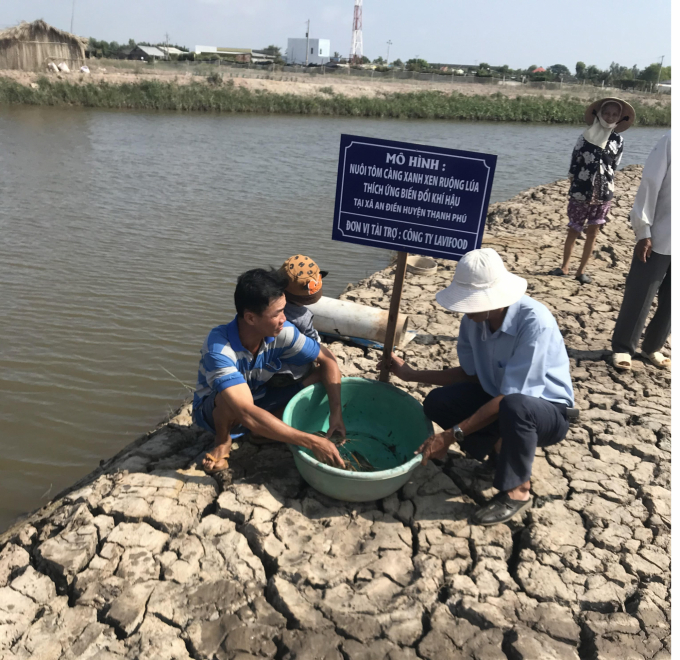
In Ben Tre, a model of shrimp farming technology, including all-male giant freshwater shrimp in paddy fields, gave birth to Thanh Phu Clean Rice brand which was grown in An Nhon and My An communes, Thanh Phu district. Photo: Nguyen Le.
Raising shrimp including giant freshwater shrimp in rice fields is recognized as an optimal solution. Over the past two years, finding short-term rice varieties with high yield such as OM4900, OM9921, OM6162, OC10, Dai 28, ST, JR64, and so on has opened up great promise because not only the rice yield is quite high with an output of 4-5 tons per hectare a crop, the value of rice and shrimp products is also enhanced.
Because during the rotation of shrimp culture, farmers did not use pesticides but shrimp yield was quite good, the average output of 1,400 kilograms of shrimp per one hectare of rice cultivation. The fact that the rice is both clean and the shrimp is naturally delicious has many sustainable benefits.
“Over the past two years, 70 farmer households from five provinces have participated in the project of alternating all-male giant freshwater shrimp and rice crops with a total farming area of nearly 80 hectares. The profit earned from rice and shrimp increased by 30% compared to those of growing rice alone.
These results show that the project implementation is very satisfactory. These results have opened up spreading expectations in the mass implementation of the project in the Mekong Delta provinces following the model of concentrating on producing all-male giant freshwater shrimp in the commodity chain, not only serving domestic but also export processing", Master Chau Huu Tri emphasized.
Also from the success of the project, recently, the Farmers Association of Ben Tre province, through the leaders of the Ben Tre Provincial Party Committee, has connected with two businesses to support funding for households implementing the project of water treatment for shrimp farming probiotics. Recorded from shrimp fields in the project after treatment, the watercolor is very good, the shrimps are growing well.
Also in Ben Tre, shrimp farming, including all-male giant freshwater shrimp in paddy fields, gave birth to Thanh Phu Clean Rice brand, which was grown in An Nhon and My An communes, Thanh Phu district.
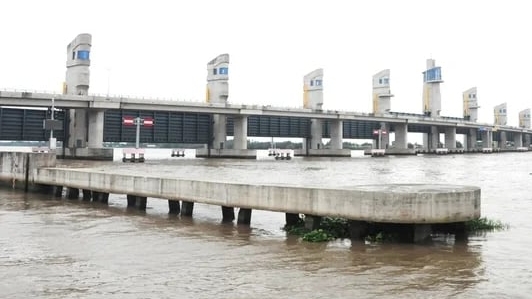
(VAN) Large-scale irrigation projects in the Mekong Delta have safeguarded a beneficiary area spanning more than 1 million hectares, significantly mitigating damage caused by drought and saltwater intrusion.
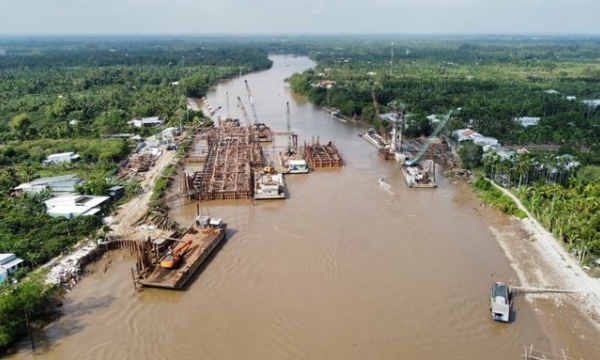
(VAN) Residents along the south bank of the Hau River are anticipating the Rach Mop lock by the end of 2024, along with projects to fortify the irrigation system to prevent saltwater intrusion.
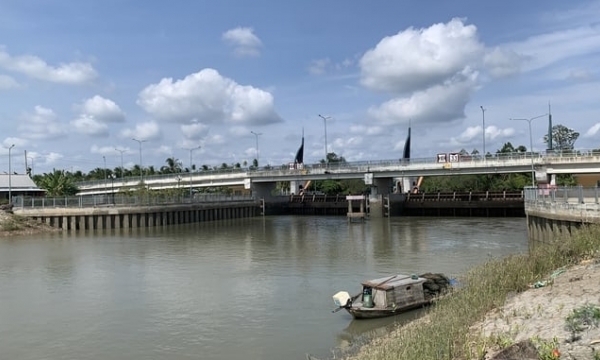
(VAN) The Bong Bot - Tan Dinh sluice delivers fresh water to meet the production demands of thousands residing in Tra Vinh province's coastal areas.
/2024/04/26/0500-3-135847_403.jpg)
(VAN) According to Dr. Dao The Anh, if indigenous varieties that are highly nutritious and adapt to climate change can be developed, the community will greatly benefit.
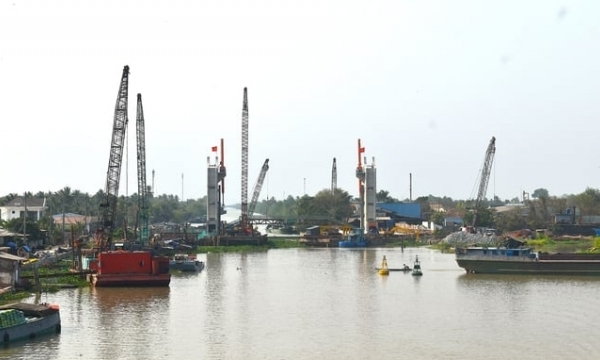
(VAN) The Nguyen Tan Thanh sluice is crucial in preventing salinity and storing freshwater to meet the daily needs of over 1.1 million residents in Tien Giang and Long An provinces.
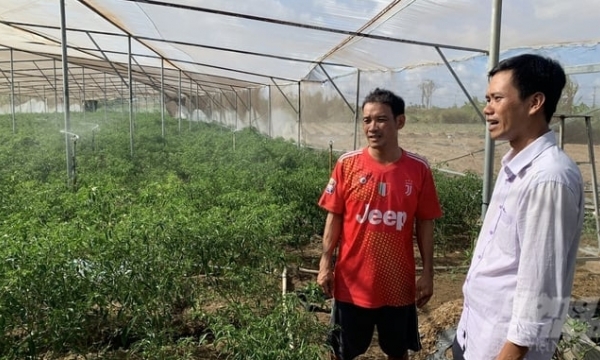
(VAN) The project, sponsored by the European Union, is implemented in Dong Thap, Kien Giang, and Tra Vinh provinces, with a total funding of 4.2 million Euros.
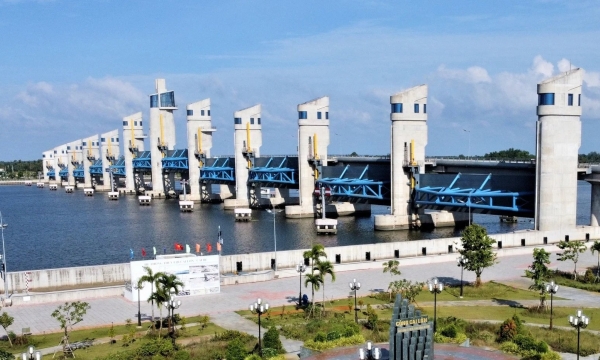
(VAN) In the heart of the Mekong Delta, the Cai Lon and Cai Be sluice gates act as guardians, halting the incursion of salty tides deep into the inland fields and managing freshwater resource distribution.